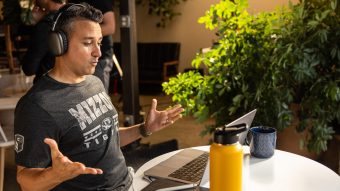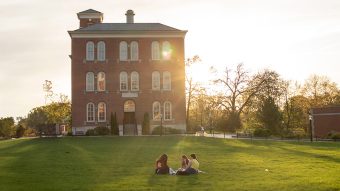
Sept. 17, 2020
Contact: Kenny Gerling, gerlingk@missouri.edu
Mizzou’s response to COVID-19 is not only steeped in science, but also designed for the long-haul, said UM System President and MU Chancellor Mun Choi when updating Missouri state legislators Tuesday.
“This pandemic may be here with us for several years,” Choi said in his testimony to the Missouri House of Representatives Special Committee on Disease Control and Prevention. “Ours is a long-term strategy, and it’s backed by the advice and counsel of medical and public health experts.”
The 30-minute hearing began with a general update from Choi, who noted the steady decline in active cases since Sept. 5 and the recent news that Boone County corrected its Aug. 21-27 positivity rate to 8.9%, far less than the 44.7% rate announced in August.
“That positivity rate of 44% gave all of us in Boone County, including me, great concern,” Choi said. “We shared our skepticism that the rate went up from about 10% to 44% in a span of just one week. We looked into the data and provided additional information to the state. And today, they revised that number.”
At 7:30 a.m. daily, Choi told legislators, he meets with a team of medical and public health experts for guidance on the trends and to share concerns. From these meetings, they frequently change the plan and protocols, citing the recently expanded face covering requirements, as an example.
This expert team also developed Mizzou’s strategy to test those with symptoms and those exposed to a person with COVID-19 and require individuals to consult a health care provider for a test referral to ensure individuals are tested at the right time. Their decision to not mass test asymptomatic individuals is backed by the American Medical Association and the CDC.
“Universities after universities are finding that the behavior of the students has not changed with their mass testing policy,” he said. “The best strategy is to assume that everyone has COVID-19, so they, one, mask up. They also have social distancing and practice good hygiene.”
At MU, any student who needs to be tested will be, and tests are free for those without insurance. In addition, the test results through MU Health Care are taking less than 24 hours, which is faster than most.
“Mass testing also does not stop COVID-19,” Choi added. “Only the change in behavior and adherence to the masking, social distancing and hygiene policy. Students, if they test at the wrong time, may get the wrong impression.”
For example, a student exposed to a person diagnosed with COVID-19 who tests earlier than they should, may test negative and then continue their normal activity, when they should be quarantining.
In the classroom, Choi said, Mizzou has had full compliance with the protocols to wear face coverings and sit at least 6 feet apart.
“There is no evidence that we have — or anyone else does — that there’s in-person transmission in classrooms,” he said.
The two main challenges Mizzou is working through are off-campus activities and keeping up with contact tracing. In response, Choi said the university is rigorously enforcing the protocols and sanctioning those who do not follow them. In the past week, the university expelled two students, suspended three students and suspended 10 student organizations, while further investigating 400 more cases.
“I’m not here to blame students for getting COVID, that would be wrong” Choi said. “But I am blaming students who willfully disregard the public health guidelines and, in some cases, knowingly spread COVID.”
To help with contact tracing, MU hired additional case investigators and contact tracers, and expanded the Care Team to respond to students faster.
Choi acknowledged community input about a potential return to remote learning. He said such a change could have many unintended consequences.
“We all recognize that there are educational disparities that cannot be overcome if we go to remote learning because of the access to technology and broadband access,” Choi said.
Though the current situation is manageable, Choi said a variety of metrics are reviewed every day and a pivot could still happen if Mizzou’s leadership team determines it is necessary.
“Our decisions are not made based on finance,” he said. “Our decisions are made based on the best medical and public health input — not only from the state, but nationally and from our own experts in Columbia.”
Choi reiterated the importance of the safety of faculty, staff and students.
“There are risks inherent in everything that we do,” he said. “But as leaders, it is our job to minimize and manage those risks to run the university, to run the community and also to help support the state.”
Watch and listen to the full presentation on the Missouri House of Representatives site.



